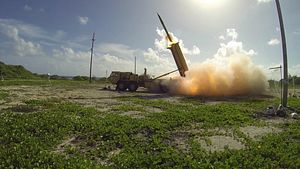Unsurprisingly, President Moon Jae-in has reconfirmed South Korea’s special ties with the United States, claiming that the “South Korea-U.S. alliance was forged by shedding blood in times of war” and “will grow to become even greater and stronger.” As part of his commitment to the alliance, Moon also gave his personal assurances on the final deployment of Terminal High Altitude Area Defense (THAAD) system, though leaving uncertainties over the so-called domestic issues that resulted in a suspension of further deployment. Moon’s message was clear: there is no problem in the previous administration’s strategic decision to deploy the THAAD system in South Korea’s territory, as it is a national necessity and a legitimate duty for South Korea in facing the threat from the North.
In this long-term strategic wrestling match, North Korea’s determination and brinkmanship with regards to its nuclear program is based on a psychological-geopolitical advantage, meaning that Pyongyang has successfully constrained the actions of regional powers — especially Beijing. The United States, however, has not pulled out from its standoff with North Korea, and it needs to increase its geopolitical advantage in the region to bolster its position with regards to China as well. The United States has at least two options to exploit in this regard: the high maneuverability of its military forces and the special ties with its allies in conflict areas.
Deployment of the THAAD system in South Korea is the best option that combines both these advantages. It plays at least two roles at once: First, it acts as a counter-measure to North Korea’s psychological-geopolitical advantage; second, it ultimately checks the strategic maneuverability of China, another regional great power.
The United States took a similar approach, albeit using different methods, in 2010, during the twin crises of the Yeonpyeong shelling and the sinking of the Cheonan. In response to these North Korean provocations, a U.S. aircraft carrier significantly entered the Yellow Sea in a joint military drill with South Korea. That had rarely happened before, and was obviously viewed by China as a dangerous move given the location of the Yellow Sea, and the short distance to China’s capital, Beijing. Nevertheless, taking such an action served the U.S. interest to permanently extend U.S. geopolitical advantage in this region, as long as there is an appropriate excuse. And North Korea seems to have given a timely one.
However, such actions may further corner China, which is absolutely not helpful to peacefully resolving the regional crisis. One possibility is that the relationships between China and the two Koreas may become unclear, if not altogether gloomy: on the one hand, a nuclear-armed North Korea that is at best China’s pseudo-friend; on the other hand, a pro-U.S. South Korea hosting the THAAD system, which China truly abhors at a threat to its own national security. This situation will be a crucial test for China’s determination and strategic skills to uphold peace and stability in the Korean Peninsula, as the United States seems to be determined to perpetuate the extension of its geopolitical advantage at China’s doorstep.

































